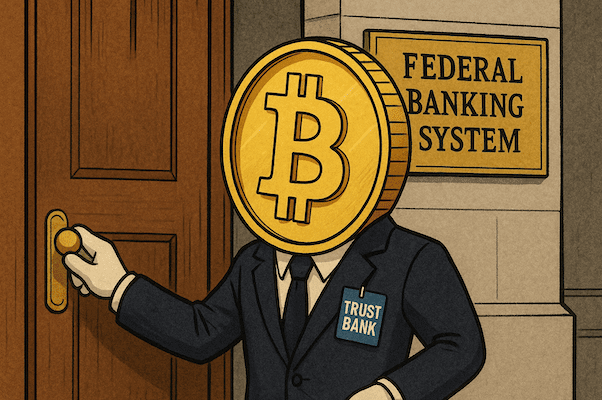
As cryptocurrency assets continue to go mainstream, financial institutions are re-evaluating their compliance roadmaps. Especially in the U.S., obtaining 'National Trust Bank' or 'Chartered Bank' status has become key for digital asset companies to gain regulatory recognition. Giants like Fidelity Digital Assets, Kraken, and Circle have all chosen different paths, and this article delves into the differences in these regulatory frameworks and their actual impacts on the industry.
National Trust Banks vs. Chartered Banks: The crossroads of financial regulation
A National Trust Bank is a special institution licensed by the Office of the Comptroller of the Currency (OCC), focusing on trust, asset custody, and investment management services. These banks typically do not accept deposits or offer loans, so they are not required to join FDIC deposit insurance like traditional banks.
In contrast, chartered banks have full banking functions, including accepting deposits, issuing loans, and opening checking accounts. These banks' licenses may come from federal or state governments and are subject to strict scrutiny by the FDIC and other regulatory bodies.
Comparison Item National Trust Bank Chartered Bank Issuing Authority Federal OCC Federal or State Government Accept Deposits Typically not accepted Yes Offer Loans Typically does not Yes FDIC Insurance Not required Mostly required Main Service Target High-net-worth individuals, institutional investors Public, businesses, retail users
Fidelity Digital Assets: Paused at the 'state trust' level
As the digital asset division of traditional financial giant Fidelity, Fidelity Digital Assets has yet to acquire a national trust bank license. According to official data, it currently holds a 'state-level trust company' license, providing digital asset custody and trading services only in limited states.
Although there have been continuous rumors in the market that Fidelity intends to apply for a national trust bank license, as of July 2025, there has been no formal confirmation or approval. In contrast, Anchorage Digital successfully obtained the first national digital asset trust bank license issued by the OCC in 2021, showing that while this path is feasible, the bar is not low.
(U.S. Department of Homeland Security's Financial Crimes Task Force investigates Anchorage Digital, potentially facing compliance issues)
Kraken: It has a banking license, but not the kind you think
Kraken obtained a state banking license called 'Special Purpose Deposit Institution (SPDI)' in cryptocurrency-friendly Wyoming as early as 2020 through its subsidiary Kraken Financial. This made Kraken the first cryptocurrency company in the U.S. to hold a banking license, but this license differs significantly from traditional commercial banks.
SPDI license allows Kraken to provide:
Digital asset custody services
Exclusive deposit accounts for institutional clients
Compliance as a 'Qualified Custodian'
But it also has many limitations, such as not being able to lend, not handling retail deposits like a typical bank, and not being covered by FDIC insurance. Additionally, SPDI is authorized by state governments, not federally approved by the OCC, meaning Kraken is neither a national trust bank nor a national chartered bank.
(Kraken launches Krak App: One-click cross-border cryptocurrency payment, idle funds can earn 10% returns)
Why have these licenses become the 'new battleground' for cryptocurrency companies?
For companies focused on asset custody, a national trust bank license can bring two major benefits:
National operational authority: Eliminates the cumbersome process of applying for licenses state by state.
Federal regulatory halo: Increases institutional client trust, attracting traditional financial capital.
For companies looking to provide full banking services, obtaining chartered bank status (such as a commercial bank license) remains a more challenging but potentially greater goal.
Trust banks do not equal real banks; traditional finance issues warnings
The differences between national trust banks and chartered banks may seem like mere technical details of regulatory scope, but they actually represent strategic choices for companies on the path of integrating cryptocurrency and traditional finance. Fidelity adopts a cautious approach, continuing to operate under state-level trust status; Kraken, on the other hand, enters the compliance market through Wyoming's special license. However, this competition of 'who is the legitimate bank' has also sparked strong interest from the traditional financial sector.
In July 2025, five major financial industry associations, including the American Bankers Association (ABA), America’s Credit Unions, and the Consumer Bankers Association (CBA), jointly sent a formal letter to the federal regulatory agency OCC, warning against hastily approving digital asset companies' applications for national trust bank licenses. The letter pointed out that most cryptocurrency companies' applications were overly vague, failing to clearly demonstrate specific 'fiduciary' functions, which are far from the core responsibilities of traditional trust banks.
More critically, these associations believe that if the OCC approves companies without substantial trust business to obtain national trust bank status, it would effectively open a 'regulatory backdoor.' These companies could gain the aura of national banks while evading comprehensive regulation, undermining regulatory fairness and potentially creating systemic risks. The associations urge the OCC to pause its reviews and initiate a more open and transparent policy consultation process.
Therefore, while cryptocurrency companies chase regulatory status, regulators and traditional banking continue to sound alarms, warning against letting 'trust banks' become loopholes disguised as legitimate entities. This battle over banking licenses may become one of the focal points of financial regulation in the coming years.
This article Who is the real bank? Analysis of the regulatory landscape of national trust banks, chartered banks, and cryptocurrency giants first appeared in Chain News ABMedia.

